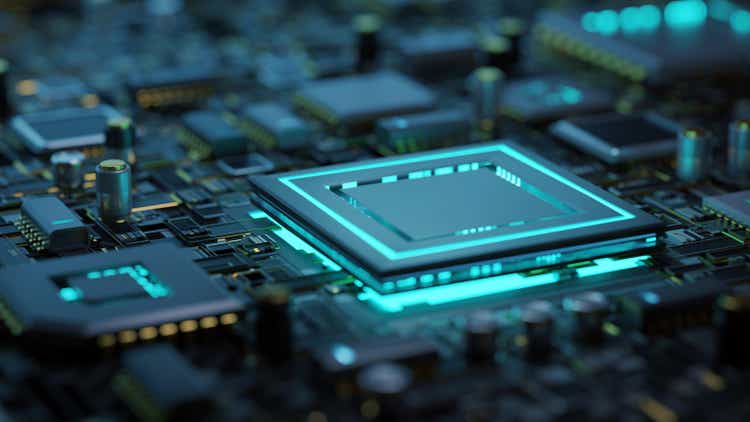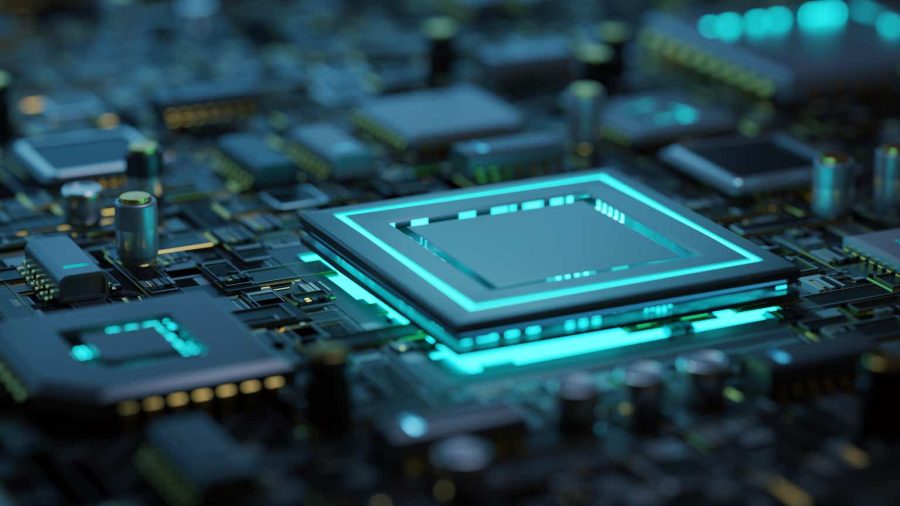Summary:
- Nvidia’s blowout earnings rocked Wall Street.
- The chip industry is seeing two “transitions”.
- Intel is being phased out with the GPU shift.
sankai
Nvidia (NVDA) stunned Wall Street with a blowout forward guidance this week. The comments from the company’s CEO and other recent developments suggest tough times ahead for Intel (NASDAQ:INTC)
Nvidia stuns Wall Street analysts with earnings
Nvidia went into this week’s earnings release with analysts questioning the company’s valuation. Deutsche Bank analysts said the company was trading on “heroic valuations” and time would tell if they were warranted.
Nvidia reported net income 26% higher than a year ago, while revenues were better than expected. However, the big event was a 50% increase in second-quarter guidance, with a projected $11 billion income. The company’s CEO again reiterated “surging demand” for its chip products, which he said were down to “two simultaneous transitions” in artificial intelligence and accelerated computing.
“A trillion dollars of installed global data center infrastructure will transition from general-purpose to accelerated computing,” CEO Jensen Huang said.
Intel will see rising competition and less demand
The key takeaway from Nvidia’s earnings for Intel was the transition to AI and increased use of GPU processing over CPU. Intel has been the dominant player in CPU processors, but Nvidia is seeing a future for GPU.
Another highlight of Nvidia’s earnings was record data center revenue, and CEO Jensen Huang told CNBC:
“The data center of the past, which was largely CPUs for file retrieval, is going to be, in the future, generative data,” Huang said. “Instead of retrieving data, you’re going to retrieve some data, but you’ve got to generate most of the data using AI.”
He added:
“So instead of millions of CPUs, you’ll have a lot fewer CPUs, but they will be connected to millions of GPUs,”
So the supply and demand picture appears to be a big demand for Nvidia GPUs and less demand for Intel’s CPUs. Open AI’s game-changing ChatGPT was also built with a large amount of GPUs.
Another development related to this shift is in accelerated computing. Reuters said that Nvidia was working with the U.K.’s University of Bristol to build a new supercomputer using its chips in a move that would compete with Intel and Advanced Micro Devices (AMD).
GPU chips are usually paired with a CPU, but Nvidia has now started shipping its own CPU named Grace. Customers of GPUs would likely want to pair them with a CPU from the same company.
The outlook for Intel looks bleak
With these dynamics, Intel will likely see demand for its CPUs dwindling and will have to consider its defensive plans against Nvidia.
Intel shares took a 7% hit a day after the Nvidia release, but I see that being the setup for further lows. Intel’s first-quarter revenue in data center and AI showed a 39% drop year-over-year. This may be the first sign of the problems ahead as Nvidia posted a record for the same segment.
“The Street was all awaiting last night’s Nvidia quarter and guidance to gauge the magnitude of this AI demand story with many skeptics saying an AI bubble was forming and instead Jensen & Co. delivered guidance for the ages,” Wedbush analyst Dan Ives.
After posting $11.7 billion in Q1 revenue, management at Intel has guided for $11.5-12.5 in Q2. The AI train looks to have left the building and Intel could be left at the station.
Conclusion
Many analysts saw Nvidia stock as potentially overvalued, but blowout earnings have shown that the sector is transitioning in two key areas, neither of which benefit Intel. Demand looks set to surge for GPU processing and become more irrelevant for CPUs. That brings a dilemma to Intel, as the company can still be the market leader, but in an area that will see slowing demand. If companies are set to increase their need for GPUs, then they may also go with Nvidia’s to ensure compatibility. The selling in Intel looks to be the start of a troubling time for the company.
Analyst’s Disclosure: I/we have no stock, option or similar derivative position in any of the companies mentioned, and no plans to initiate any such positions within the next 72 hours. I wrote this article myself, and it expresses my own opinions. I am not receiving compensation for it (other than from Seeking Alpha). I have no business relationship with any company whose stock is mentioned in this article.
Seeking Alpha’s Disclosure: Past performance is no guarantee of future results. No recommendation or advice is being given as to whether any investment is suitable for a particular investor. Any views or opinions expressed above may not reflect those of Seeking Alpha as a whole. Seeking Alpha is not a licensed securities dealer, broker or US investment adviser or investment bank. Our analysts are third party authors that include both professional investors and individual investors who may not be licensed or certified by any institute or regulatory body.
